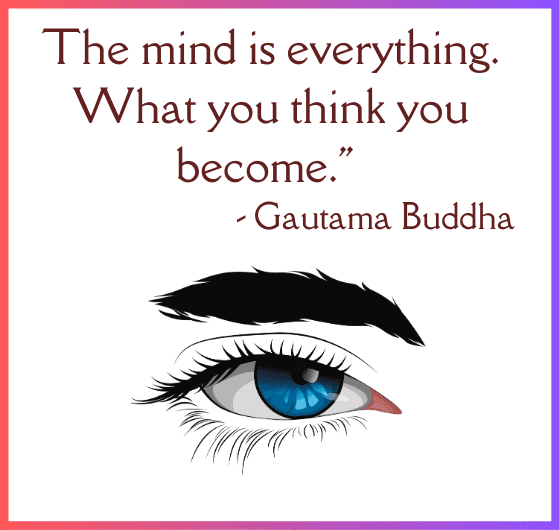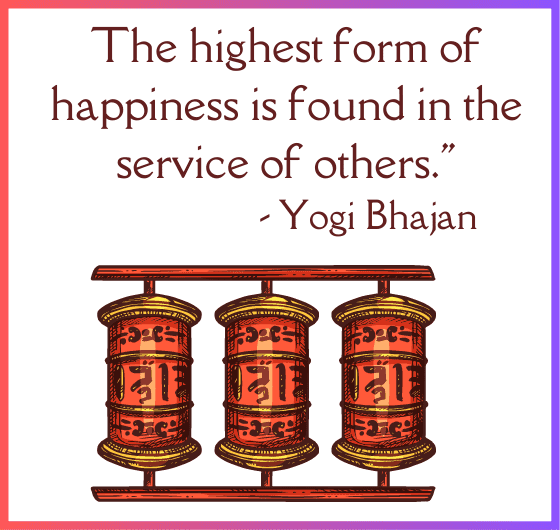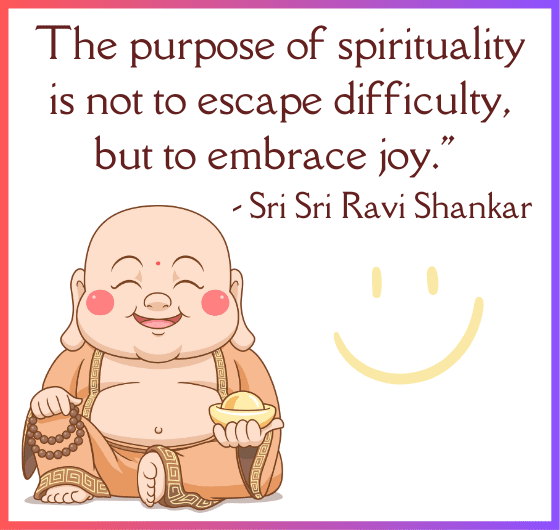Indian spirituality and happiness have a strong correlation. Spirituality in India is not just limited to religious beliefs, but it is deeply ingrained in the culture and way of life. Many spiritual practices such as yoga, meditation, and pranayama are known to enhance overall well-being and happiness.
“The purpose of spirituality is to replace hatred with love, anger with compassion, and ignorance with wisdom.” – Sri Sri Ravi Shankar
Indian spirituality emphasizes the importance of connecting with one’s inner self, finding inner peace, and living in harmony with the universe. It focuses on developing a positive attitude towards life and accepting life’s challenges with grace and equanimity.
This approach to life encourages individuals to find meaning and purpose in their existence and to serve others.
The ancient Indian scriptures such as the Vedas and Upanishads are rich sources of spiritual wisdom and guidance. They teach that happiness is not just a state of mind, but a way of life.
Vedas emphasize the importance of living a virtuous life, practicing self-control, and cultivating positive relationships with others.
In India, spiritual practices are not just limited to individual pursuits, but are also a part of communal rituals and celebrations.
Festivals such as Diwali, Holi, and Dussehra are not just occasions for merriment, but also provide an opportunity for spiritual reflection and renewal.
Indian spirituality has much to offer in terms of promoting happiness and well-being.
By incorporating spiritual practices in our daily lives, we can cultivate a deeper sense of connection with ourselves, others, and the world around us. This can lead to greater joy, peace, and fulfillment in our lives.
“The essence of spirituality is to be constantly aware of the oneness of all, at the same time to celebrate the uniqueness of the individual.” – Jaggi Vasudev

Discovering Inner Peace: Indian Spiritual Practices for Lasting Happiness
India is known for its diverse spiritual practices that promote inner peace and happiness. One of the key spiritual practices is yoga, which is a combination of physical postures and breathing exercises.
Meditation is another popular practice that is believed to bring calmness and clarity to the mind.
In addition, chanting mantras and Bhajans (devotional songs) are also common practices in Indian spirituality that can uplift the mood and bring a sense of contentment.
Many people also follow a vegetarian diet as a part of their spiritual practice, which is believed to promote physical and mental health.
The concept of seva or selfless service is also deeply ingrained in Indian spiritual traditions. By helping others and contributing to the community, individuals can experience a sense of fulfillment and purpose.
Overall, Indian spiritual practices emphasize the importance of cultivating a positive and peaceful state of mind, which is believed to be the key to true happiness.
“The mind is everything. What you think you become.” – Gautama Buddha
The connection between Indian spirituality and happiness
Indian spirituality is deeply rooted in the belief that true happiness comes from within. It emphasizes the importance of leading a virtuous life, being selfless, and practicing gratitude.
The connection between Indian spirituality and happiness lies in the understanding that happiness is not just a fleeting emotion but a state of being that requires inner peace and contentment.
Various spiritual practices such as meditation, yoga, and pranayama are widely followed in India to attain this state of inner happiness. These practices help individuals connect with their inner selves, calm their minds, and cultivate a sense of mindfulness.
They also promote self-awareness, which in turn helps people understand their thoughts and emotions better and cope with them in a positive manner.
Indian spirituality also emphasizes the importance of developing a deep and meaningful relationship with a higher power. This relationship can bring comfort and solace in times of hardship and provide a sense of purpose and direction in life.
In essence, Indian spirituality is a holistic approach to happiness that emphasizes the importance of physical, mental, and spiritual well-being.
Indian spirituality promotes practices that not only bring inner peace and contentment, but also contribute to the overall happiness and well-being of the community.
“The highest goal of human life is to discover the truth of our being, and to live in accordance with that truth.” – Swami Rama

Hot Spiritual Beliefs for Happiness in India
1.. Spirituality has been an integral part of Indian culture for centuries, with beliefs and practices aimed at promoting inner peace and happiness.
2. For many Indians, spirituality is a way of life, a guiding force that helps them find purpose and meaning in the world.
3 Indian spiritual practices are diverse and encompass a range of beliefs, including Hinduism, Buddhism, Jainism, Sikhism, and more.
4. These spiritual practices emphasize the importance of compassion, gratitude, and mindfulness as ways to cultivate happiness and contentment.
5. One of the core beliefs in Indian spirituality is that true happiness comes from within, and that external circumstances are temporary and fleeting.
6. Many spiritual practices in India also emphasize the importance of connecting with others and building a supportive community as a source of happiness.
7. Yoga and meditation are widely practiced in India and are recognized globally as effective tools for reducing stress and increasing happiness.
8. Indian spiritual practices also include rituals and ceremonies that promote a sense of belonging and connection to the divine, such as puja and aarti.
9. Spirituality in India is not limited to a particular age group or gender; people from all walks of life can benefit from its teachings and practices.
10. Ultimately, Indian spiritual beliefs offer a path to finding happiness and inner peace, no matter what challenges one may face in life.
“The highest form of happiness is found in the service of others.” – Yogi Bhajan
Ancient Indian wisdom for happiness
Ancient Indian wisdom offers valuable insights on finding happiness and contentment in life. The wisdom that has been passed down through generations includes practices such as mindfulness, meditation, and yoga.
These practices aim to cultivate a deeper understanding of the self and the world around us, leading to a sense of inner peace and joy.
The concept of “Ahimsa,” or non-violence, is another significant aspect of Indian wisdom that promotes happiness. Ahimsa emphasizes the importance of compassion and kindness towards all living beings, including animals and nature.
Indian spirituality also emphasizes the idea of “seva,” or selfless service, as a means of finding happiness. Serving others and working towards the greater good is believed to bring a sense of purpose and fulfillment to one’s life.
The teachings of Indian spirituality also stress the importance of detachment from material possessions and the pursuit of worldly desires.
This detachment allows one to focus on spiritual growth and find happiness in simple things like nature, relationships, and inner peace.
In essence, Indian spirituality offers a holistic approach to finding happiness that goes beyond the temporary pleasures of life.
It emphasizes the importance of inner growth and spiritual well-being to achieve lasting happiness and fulfillment.
“True happiness is when the love that is within us finds expression in external activities.” – Amma (Mata Amritanandamayi)

Yoga and Meditation for Happiness in India
Yoga and meditation have been an integral part of Indian culture for centuries and are known to provide numerous benefits, including promoting happiness and well-being.
These practices allow individuals to connect with their inner selves, increase mindfulness, and reduce stress and anxiety, ultimately leading to a happier and healthier life.
In India, yoga and meditation are often seen as a way of life rather than just physical exercises, with many people incorporating them into their daily routines.
The focus on breath and movement in yoga, combined with the stillness and introspection of meditation, can bring about a sense of calm and clarity that can positively impact one’s mental and emotional state.
Through these practices, individuals can cultivate a greater sense of self-awareness and inner peace, which can ultimately lead to a more fulfilling and joyful life.
The secret of happiness is to see all the marvels of the world and never to forget the drops of oil on the spoon.” – Paulo Coelho
Indian Philosophy and Happiness
** Indian philosophy emphasizes the importance of living a balanced and contented life, which ultimately leads to happiness.
** One key aspect of Indian philosophy is the concept of Dharma, or the duty or righteous way of living, which is believed to bring inner peace and happiness.
** The practice of mindfulness and self-awareness through meditation and yoga are also rooted in Indian philosophy and can help to cultivate a sense of peace and happiness in daily life.
** Another aspect of Indian philosophy is the belief in karma or the idea that our actions have consequences that determine our future. By living in accordance with ethical principles, one can cultivate a sense of inner peace and contentment.
** Indian philosophy also stresses the importance of cultivating positive relationships and treating others with compassion and kindness, which can contribute to a sense of happiness and well-being.
** Ultimately, the goal of Indian philosophy is to achieve a state of inner peace and contentment, which can lead to a fulfilling and happy life.
Happiness in Indian spiritual traditions.
Happiness has been a central theme in Indian spiritual traditions for centuries. Many of these traditions, such as yoga, meditation, and Ayurveda, have been adopted globally and are widely recognized for their positive impact on mental and physical health.
In Indian spiritual traditions, happiness is often viewed as an internal state of being that can be cultivated through practices such as mindfulness, gratitude, and self-awareness.
The aim is not to attain external pleasures but to find contentment within oneself.
One of the core beliefs in Indian spiritual traditions is that happiness is not a fleeting emotion but a state of being that can be sustained through conscious effort.
This involves embracing a holistic approach to life, which emphasizes balance and harmony in all aspects of one’s being.
By adopting practices such as yoga, meditation, and Ayurveda, individuals can develop a deeper understanding of themselves and the world around them, leading to greater levels of contentment and happiness.
These practices also promote a sense of interconnectedness with others, which can foster a sense of community and belonging, further contributing to one’s overall happiness.
Happiness is when what you think, what you say, and what you do are in harmony.” – Mahatma Gandhi
The Role of Spirituality in Indian Happiness
Spirituality has always been a fundamental aspect of Indian culture and traditions. The connection between spirituality and happiness has been recognized for centuries, with many spiritual practices aimed at cultivating inner peace and joy.
Meditation, yoga, and other mindfulness practices are popular in India and have been shown to have a positive impact on mental health and well-being.
Indian spiritual beliefs also emphasize the importance of compassion, gratitude, and serving others, which can bring a sense of purpose and fulfillment to life.
The spiritual practices and beliefs in India are deeply rooted in ancient wisdom, with a focus on the interconnectedness of all things and the ultimate goal of finding inner peace and enlightenment.
The role of spirituality in Indian happiness is not just limited to personal growth but also extends to the community, with many spiritual gatherings and festivals aimed at promoting happiness and well-being for all.
In India, spirituality is not just a religious practice but a way of life, with many individuals finding solace and happiness through connecting with a higher power and a sense of purpose beyond material possessions.
The importance of spirituality in Indian culture is reflected in the daily practices and rituals that promote inner peace and joy, making it an essential aspect of Indian happiness.
“The purpose of spirituality is not to escape difficulty, but to embrace joy.” – Sri Sri Ravi Shankar
Indian spirituality and mental health
** Indian spirituality emphasizes the importance of maintaining a balance between mind, body, and spirit for good mental health.
** Practices such as yoga, meditation, and pranayama are known to reduce stress and anxiety and promote relaxation and inner peace.
** Spiritual practices also encourage self-reflection, self-awareness, and self-acceptance, which can lead to greater mental clarity and emotional stability.
** In Indian spiritual traditions, seeking guidance and support from a spiritual mentor or guru is considered an important aspect of mental well-being.
** The ancient Indian wisdom of Ayurveda offers natural remedies and lifestyle practices to improve mental health, including diet, herbal supplements, and daily routines.
** Spiritual festivals and gatherings provide a sense of community and connection, which can have a positive impact on mental health by reducing loneliness and promoting social support.
** Indian spiritual traditions promote the importance of cultivating virtues such as compassion, gratitude, and forgiveness, which can enhance overall well-being and contribute to better mental health.
** Mindful living and being present in the moment are also integral aspects of Indian spiritual practices and can help individuals develop a greater sense of inner peace and happiness.
The purpose of our lives is to be happy” – Dalai Lama

The Impact of Indian Spirituality on Happiness
** Indian spirituality emphasizes inner peace and contentment as the key to happiness.
** Practices like yoga, meditation, and mindfulness are widely used in India to cultivate mental and emotional well-being.
** Spiritual beliefs that emphasize compassion, kindness, and service to others can also lead to greater happiness.
** Many Indian festivals and traditions are rooted in spiritual beliefs and provide opportunities for connection, celebration, and joy.
** Indian spirituality recognizes the importance of balancing material and spiritual aspects of life for true happiness.
** The deep sense of community and connection in Indian spirituality can also contribute to greater happiness and well-being.
“There is no path to happiness. Happiness is the path.” – Buddha
Interesting facts:
Related to “Unlocking the Secrets of Lasting Happiness: Ancient Indian Spirituality“:
1.. Ancient Indian spirituality places a strong emphasis on inner peace and contentment as the foundations of lasting happiness.
2. Yoga, a practice originating from ancient India, is known for its ability to promote physical and mental well-being, ultimately leading to greater happiness.
3. Meditation techniques, such as mindfulness and Vipassana, have been practiced in India for thousands of years and are scientifically proven to enhance happiness and overall mental health.
4. Ayurveda, the traditional Indian system of medicine, recognizes the mind-body connection and offers holistic approaches to promote happiness and well-being.
5. The concept of “Dharma” in Indian spirituality teaches individuals to align their actions with their higher purpose, leading to a sense of fulfillment and happiness.
6. Indian spiritual texts, such as the Bhagavad Gita and Upanishads, provide profound wisdom and guidance on finding lasting happiness through self-realization and self-transcendence.
7. Seva, the practice of selfless service, is deeply rooted in Indian spirituality and is believed to bring immense joy and happiness by helping others.
8. Indian festivals, like Diwali and Navratri, are not just cultural celebrations, but also opportunities to deepen spiritual connections and experience the happiness that comes from unity and devotion.
9. The practice of gratitude, known as “pranidhana” in Indian spirituality, is believed to cultivate a positive mindset and enhance happiness by focusing on the blessings in one’s life.
10. Indian spiritual masters, such as Ramana Maharshi, Sri Sri Ravi Shankar, and Amma (Mata Amritanandamayi), have touched millions of lives worldwide with their teachings on happiness, inner peace, and self-realization.
These facts highlight the profound wisdom and practices within ancient Indian spirituality that can unlock the secrets to lasting happiness.
“Happiness is the spiritual experience of living every minute with love, grace, and gratitude.” – Denis Waitley
Give me some more:
>> Yoga, a popular Indian spiritual practice, has been scientifically proven to have numerous physical and mental health benefits, including reducing stress and anxiety.
>> The Indian festival of Holi, also known as the “Festival of Colors,” is a celebration of joy, love, and the victory of good over evil. It is a time for people to come together and enjoy the moment.
>> The concept of karma, which is an important part of Indian spirituality, teaches that our actions have consequences and can affect our happiness and well-being in this life and in future lives.
>> The practice of meditation, which has roots in ancient Indian spirituality, has gained popularity in recent years for its ability to reduce stress and improve mental clarity and focus.
Story of a Guru Teaching the Secrets of Lasting Happiness with Indian Spirituality
Title: The Quest for Lasting Happiness: Unveiling the Secrets of Indian Spirituality
Once upon a time, in a picturesque village nestled amidst the serene valleys of India, there lived a wise and enlightened Guru named Devendra. Devendra had spent years studying the profound teachings of Indian spirituality and had discovered the secrets of lasting happiness.
One day, a curious young student named Rahul approached the Guru, seeking guidance on finding true and enduring happiness.
With a gentle smile, Guru Devendra welcomed Rahul and said, “Rahul, happiness is not a destination; it is a journey. It lies within us, waiting to be unveiled. Let me share the secrets of lasting happiness with you.”
As the sun set behind the hills, they sat under a banyan tree, engrossed in their conversation.
Firstly, Guru Devendra explained, “Rahul, the key to lasting happiness lies in embracing gratitude. When we appreciate the present moment and express gratitude for the blessings in our lives, our hearts fill with contentment.”
He illustrated this by sharing the story of a humble farmer who found immense joy in the simple act of sowing seeds and watching his crops grow.
Furthermore, Guru Devendra emphasized the power of self-discovery through meditation. “By delving within ourselves through meditation,” he said, “we can cultivate inner peace and a profound sense of happiness.”
He shared the tale of a young seeker who, amidst the chaos of a bustling city, found solace by meditating under the shade of a tree, experiencing a sense of connection with the divine.
Transitioning to another secret, Guru Devendra revealed, “Compassion and selfless service are the foundations of lasting happiness.”
He narrated the story of a kind-hearted doctor who dedicated his life to serving the underprivileged, finding joy and purpose in bringing smiles to those in need.
As the conversation continued, Rahul eagerly absorbed each word, his curiosity growing with each passing moment.
Guru Devendra then introduced the concept of detachment, explaining, “To find lasting happiness, we must detach ourselves from material possessions and external circumstances.
True happiness arises when we cultivate a sense of inner peace and contentment.” He shared the story of a successful businessman who, after renouncing his material wealth, discovered unparalleled happiness in a simple, minimalist lifestyle.
As the night sky filled with stars, Rahul felt a newfound sense of clarity and purpose. With gratitude, he thanked Guru Devendra for sharing these invaluable teachings.
From that day forward, Rahul dedicated himself to following the path of Indian spirituality, embracing gratitude, meditation, compassion, and detachment.
In their final moments together, Guru Devendra imparted his final words of wisdom, “Rahul, remember that lasting happiness resides within you.
Embrace these teachings with an open heart, and may your journey be filled with joy, peace, and enlightenment.”
With deep gratitude and a sense of purpose, Rahul embarked on his path, determined to uncover the secrets of lasting happiness with Indian spirituality.
“The key to happiness is inner peace. The greatest obstacles to inner peace are disturbing emotions such as anger, attachment, fear, and suspicion.” – Dalai Lama
Riddles make life Better:
Riddles related to “Unlocking the Secrets of Lasting Happiness: Ancient Indian Spirituality”:
Riddle 1: I am a state of deep tranquility, a practice of self-awareness and inner exploration. What am I?
Riddle 2: I am a sacred sound, a vibrational mantra that brings harmony to the mind and soul. What am I?
Riddle 3: I am a life force energy that flows through the body. When balanced, I bring vitality and happiness. What am I?
Riddle 4: I am a practice of selfless service, where happiness is found in helping others. What am I?
Riddle 5: I am a timeless scripture, containing profound teachings on life, happiness, and self-realization. What am I?
Riddle 6: I am the state of self-realization and oneness with the divine. What am I?
Riddle 7: I am the practice of focusing on the present moment, finding joy in the here and now. What am I?
Riddle 8: I am a spiritual festival of lights, symbolizing the victory of light over darkness and good over evil. What am I?
Riddle 9: I am the discipline of physical postures, breath control, and meditation. What am I?
Riddle 10: I am the ultimate goal of human existence, a state of pure bliss and liberation. What am I?
Answers:-
Answer 1: Meditation
Answer 2: Om (Aum)
Answer 3: Prana (life force)
Answer 4: Seva (selfless service)
Answer 5: Bhagavad Gita
Answer 6: Enlightenment
Answer 7: Mindfulness
Answer 8: Diwali
Answer 9: Yoga
Answer 10: Moksha (liberation)
These riddles will engage your mind and prompt you to think about the concepts and practices related to unlocking the secrets of lasting happiness in ancient Indian spirituality. Enjoy solving them!

Applying the Secrets of Lasting Happiness: Ancient Indian Spirituality for a Better Life
Ancient Indian spirituality offers timeless wisdom and practices that can help us unlock the secrets to lasting happiness. By incorporating these teachings into our lives, we can experience profound benefits and transform our well-being.
Here are some simple ways to apply the secrets of ancient Indian spirituality and the benefits they can bring:
1.. Meditation and Mindfulness: Regular meditation and mindfulness practices calm the mind, reduce stress, and cultivate inner peace. They enable us to live in the present moment, enhancing our focus and clarity.
The benefits include improved emotional well-being, reduced anxiety, and a greater sense of contentment.
2. Practicing Gratitude: Cultivating gratitude for the blessings in our lives shifts our focus from lack to abundance. By acknowledging and appreciating what we have, we invite more positivity and joy.
This practice fosters a deep sense of contentment, leading to lasting happiness.
3. Selfless Service (Seva): Engaging in acts of kindness and selfless service brings immense joy and fulfillment. By helping others without expecting anything in return, we experience a sense of interconnectedness and purpose.
This practice promotes empathy, compassion, and a greater sense of happiness.
4. Living in Alignment with Values: Ancient Indian spirituality encourages living in alignment with our core values. By identifying our values and making choices that align with them, we experience a sense of authenticity and fulfillment.
This practice promotes self-empowerment, self-acceptance, and overall well-being.
5. Yoga and Physical Well-being: Incorporating yoga asanas (poses) and pranayama (breathing exercises) into our routine improves physical health, flexibility, and energy levels.
The mind-body connection nurtured through these practices enhances emotional well-being, reduces stress, and promotes a sense of harmony within.
6. Seeking Inner Wisdom: Ancient Indian spirituality encourages self-reflection and self-inquiry. By exploring our inner world, we gain insights into our true nature and purpose. This journey of self-discovery leads to self-realization and a deep sense of happiness and fulfillment.
By applying the secrets of ancient Indian spirituality, we can cultivate lasting happiness, inner peace, and a meaningful existence.
These practices offer practical tools for navigating life’s challenges, finding purpose, and experiencing profound joy.
Embracing these teachings allows us to unlock the limitless potential within us and create a life filled with contentment, love, and happiness.

